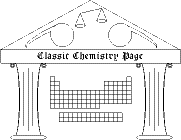Boyle's Law: Formulation
Content: data analysis, gas laws, spreadsheet chemistry
Level: advanced
Reference: Robert Boyle, A Defence of the Doctrine Touching the Spring And Weight of the Air (1662)
Notes: Robert Boyle (1627-1691) was a key figure in Englightenment science and one of its most prominent practitioners of experimental natural philosophy. He was an important early member of the Royal Society in England, and he conducted significant research in the disciplines we now call chemistry and physics.
Using Boyle and the gas law that bears his name in historically based science pedagogy is not a new idea. For example, see:
- James Bryant Conant, Robert Boyle's experiments in pneumatics (Cambridge, MA: Harvard, 1950), later part of the collection James Bryant Conant, Ed., Harvard Case Histories in Experimental Science, vol. 1 (Cambridge, MA: Harvard, 1957)
- Frank Fazio, "Using Robert Boyle's Original Data in the Physics and Chemistry Classrooms," Journal of College Science Teaching 21, 363-365 (1992) and references therein.
Finally, a word about the data table. Both the "pressures" and the "volumes" are given in inches--inches of mercury and inches of air in a tube of constant cross-section. Actually, Boyle reported all of the measurements as fractions, i.e., as inches and 16ths of an inch. There is one error in column D that appears to be a typographical error in Boyle's publication. For the "volume" of 17, the total pressure ought to be 87 4/16, but 87 14/16 is printed. I have let this error stand; after all, not even Boyle's data were perfect!
Solutions: To download solutions, go to:
http://web.lemoyne.edu/giunta/classicalcs/boyleform.doc
To download worked spreadsheet, go to:
http://web.lemoyne.edu/giunta/classicalcs/boyleans.xls
Copyright 2003 by Carmen Giunta. Permission is granted to reproduce for non-commercial educational purposes.

| Back to the top of the Classic Chemistry site |